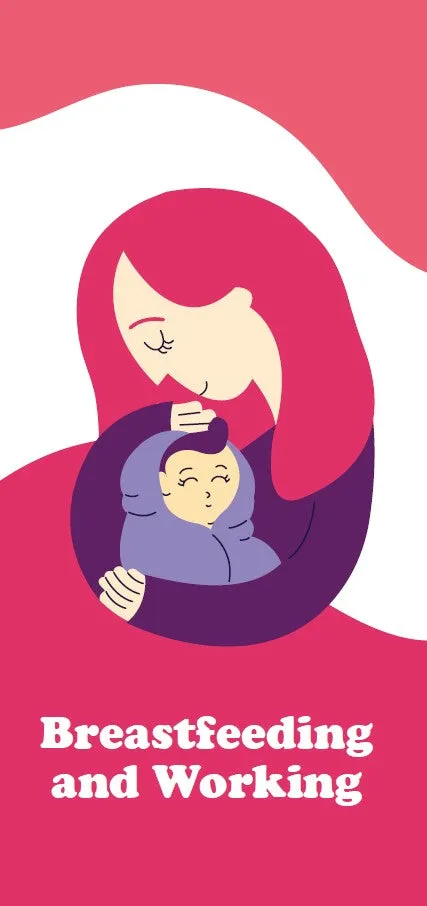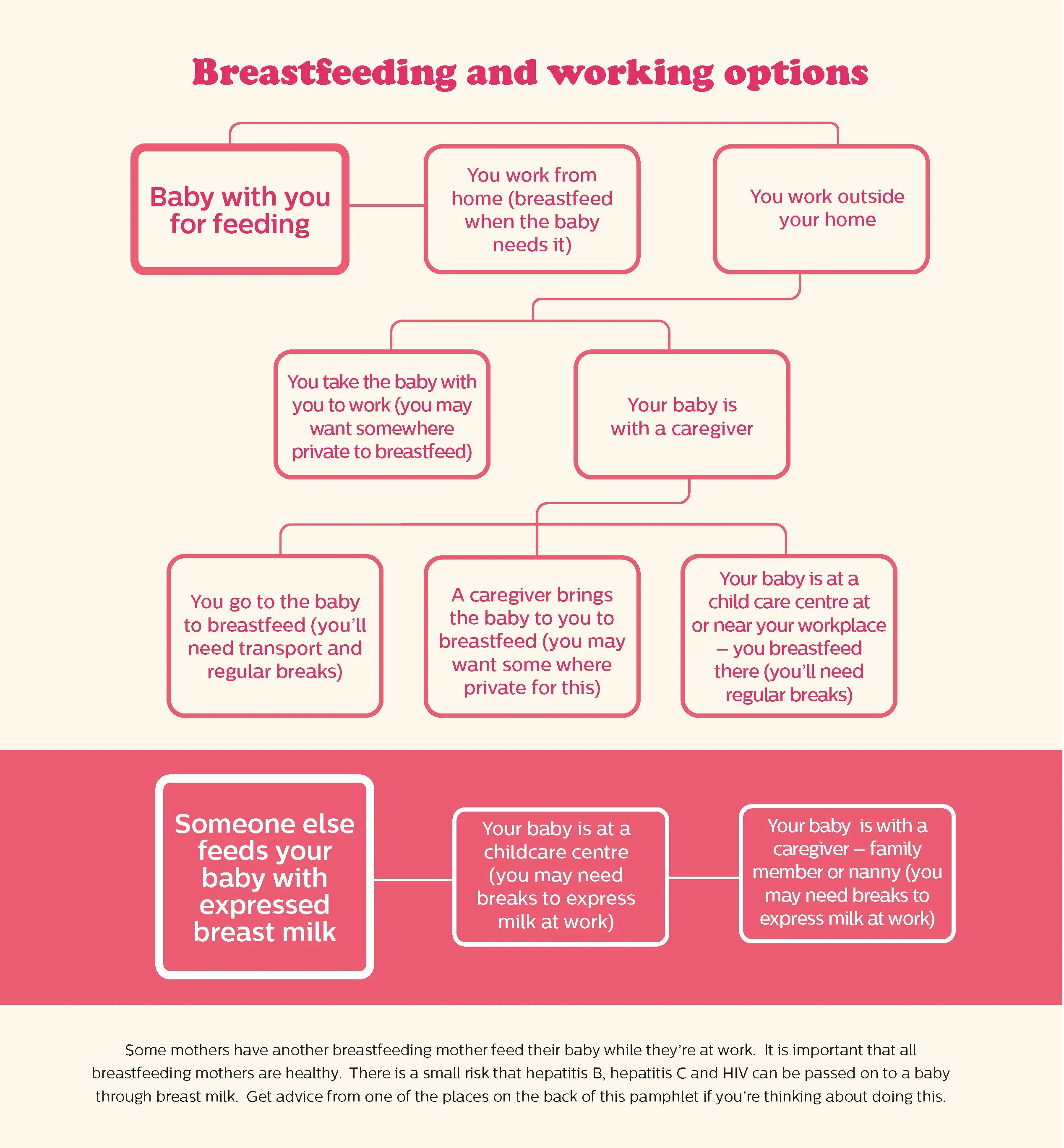Benefits of breastfeeding
If you’re returning to work - or study - after having a baby, continuing to breastfeed is...
Best for your baby
- Breast milk is all that your baby needs to eat and drink for about the first 6 months.
- Breast milk is still important for your baby when you introduce solid foods at around 6 months. If possible, keep breastfeeding until your baby is 12 months or older
- Breastfeeding means a healthier baby – fewer colds, tummy bugs, chest infections and allergies.
- Breastfeeding helps you and the baby form a close bond. This bond is needed for emotional well-being throughout your baby’s life.
Best for you
- You know you’re doing something special for your baby.
- It saves time preparing formula.
- It saves money.
- You’re less likely to get breast or ovarian cancer.
- You’re less likely to have hip fractures when you’re older.
Best for your employer
- You’ll have less time off with a sick baby.
- You’ll work better knowing your child is getting the best start.
- Your workplace will be known as family-friendly.
It usually takes about 6–8 weeks to establish breastfeeding properly and build up a good milk supply – delay going back to work as long as you can. Maybe you could go back to work gradually – by job sharing or working part time for a while.
Breastfeeding and working options
- Baby with you for feeding:
- You work from home (breastfeed when the baby needs it)
- You work outside your home:
- You take the baby with you to work (you may want somewhere private to breastfeed)
- Your baby is with a caregiver:
- You go to the baby to breastfeed (you’ll need transport and regular breaks)
- A caregiver brings the baby to you to breastfeed (you may want somewhere private for this)
- Your baby is at a childcare centre at or near your workplace – you breastfeed there (you’ll need regular breaks)
- Someone else feeds your baby with expressed breast milk:
- Your baby is at a childcare centre (you may need breaks to express milk at work)
- Your baby is with a caregiver – family member or nanny (you may need breaks to express milk at work)
Some mothers have another breastfeeding mother feed their baby while they’re at work. It is important that all breastfeeding mothers are healthy. There is a small risk that hepatitis B, hepatitis C and HIV can be passed on to a baby through breast milk. Get advice from one of the places on the back of this pamphlet if you’re thinking about doing this.
Before you go back to work
Talk to your employer (you may want to take someone with you)
Explain the benefits for your employer of you continuing to breastfeed.
- Explain that to breastfeed or express, all you will need is:
- a clean, private place
- a comfortable chair
- at least two 20-minute breaks.
- And if you’re expressing:
- a power point (if you’re using an electric pump)
- a fridge or somewhere to store a chillybin with ice packs
- running water to wash expressing equipment.
If you’re going to be giving your baby expressed breast milk:
- Make sure that breastfeeding is going really well first.
- Start expressing 2–3 weeks before you go back to work.
- Get baby used to having your expressed milk in a bottle.
- Get baby used to being fed by someone else besides you.
- Keep breastfeeding often.
- Build up a good supply of expressed milk in the freezer.
If you decide to stop breastfeeding, try not to do this at the same time as starting work. This is hard on both you and your baby. Mixed feeding - giving your baby both breastmilk and infant formula - might be a good option for you rather than stopping breastfeeding altogether. Any breast milk that your baby gets is great! It doesn't have to be 'all or nothing.'
If you have difficulties getting support from your workplace, visit for advice and support.
Storing
- Express your breast milk into a clean, airtight container with a sealed lid or a breast milk bag.
- Date all stored milk.
- Refrigerate or freeze breast milk as soon as possible. Store in the bottom half of the fridge or freezer and towards the back.
Store breast milk for:
- 4 hours at room temperature (keep it cool in a damp towel)
- 48 hours (2 days) in the fridge
- 2 weeks in the freezer box in the fridge
- 3–6 months in the separate freezer part of the fridge-freezer
- 6 months in a separate chest freezer.
- If expressing at work, store milk in fridge or chillybin with ice packs until you get home.
- Thaw frozen milk gradually.
- Breast milk is OK for up to 24 hours after thawing.
- Don’t refreeze after thawing.
Do not boil or microwave breast milk.
Expressing milk
- Manual pump
- Electric pump
- Hand
Buy or hire an electric pump from a pharmacy, baby shop, lactation consultant or hospital. If you think your milk supply is getting low, breastfeed and express more often.
Cleaning
- Wash and rinse pumps and containers in very hot water.
If your baby is under three months old, sterilise pumps and containers by:
- boiling in water for 5 minutes, or
- soaking in a sterilising solution for 1 hour, or
- some pumps can be sterilised in a microwave.
Malia – went back to work at the hospital when her baby was 4 months.
Your baby will benefit from being breastfed at any age – breastfeed as long as you can.
Hannah – sometimes works from home and sometimes takes her baby to work with her. The baby is 10 weeks old.
Take care of yourself – ask for help from friends, family and whānau.
Ruby – Ruby’s partner Joe looks after their 5-month-old baby while she studies at university.
Breastfeeding works by supply and demand – the more you feed your baby, the more milk you’ll have.
Caro – went back to work fulltime when her baby Willa was 13 weeks old. Willa's Dad looks after her.
If you’re breastfeeding, eat well and drink plenty of water.
Hinemoa – went back to work when her baby was 6 months. Baby goes to a kōhanga reo.
Do a practice run before returning to work to make sure everything runs smoothly on the day.
Getting support for yourself
Ask family and friends for help
- Be specific about what you need: housework, cooking, shopping, washing, looking after older children.
- Your partner and/or other family members can help with the baby by bathing, playing, singing, changing nappies, reading stories, going out for a walk.
Getting help with breastfeeding and working
For support and information about:
- issues with breastfeeding
- learning how to express breast milk
- breast pumps
- managing breastfeeding when you return to work
Either call or look online:
- Your midwife or doctor
- Your Well Child or nurse
- A private lactation consultant (there will be a charge)
- Plunketline – 24 hours, 7 days, freephone
- Ministry of Health
or talk to a friend or family member who has returned to work and breastfed successfully. If infant formula is needed, talk to your midwife, family doctor, practice nurse or a lactation consultant.
If the advice isn't working or you're not happy with it – get a second opinion.
















